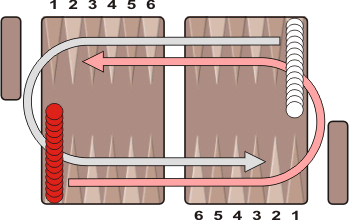![[Backgammon Galore!]](/gif/GaloreButton.gif)
|
|
Backgammon Variants Setup: Each player starts with fifteen checkers on the rightmost point of the far side of the board, at diagonally opposite corners from each other. They both move in the same direction, counterclockwise, around the board.
Object: The object of the game is to move all your checkers around the board and bear them off. White bears off at the lower-right; Red bears off at the upper-left. To start: Both players roll one die and the higher number goes first. That player rolls the dice again to begin his turn. After the first game, the winner of the previous game goes first. Movement: The roll of the dice indicates how many points, or pips, the player is to move his checkers. The following rules apply:
Moving off the "head": The starting point for either player is called that player's "head." You may move only one checker off of your head each turn. The one exception is the first roll of the game in which you may move two checkers off your head. Two off the head is forced when a player rolls 3-3, 4-4, or 6-6 for his first roll. No hitting: A major difference between Narde and other forms of backgammon is that there is no hitting in this game. One checker by itself controls a point, and an opposing checker may not land or touch down there. Limitation on primes: You may not build a prime (six consecutive blocks) in front of all of the opponent's checkers; at least one opposing checker must be in front of your prime. Bearing off: Once you have moved all fifteen of your checkers into their finishing table, you may begin bearing off. You bear off a checker by rolling a number that corresponds to the point on which it resides, then removing the checker from the board. If there is no checker on the point indicated by the roll, you must make a legal move using a checker on a higher-numbered point. If there are no checkers on higher-numbered points, you must remove a checker from the highest point that has a checker. Scoring: The first player to bear off all his checkers wins the game and scores one point. If the winner bears off all his checkers before the loser has borne off any, he gets two points.
References
|
![]()
Backgammon Galore : Variants

